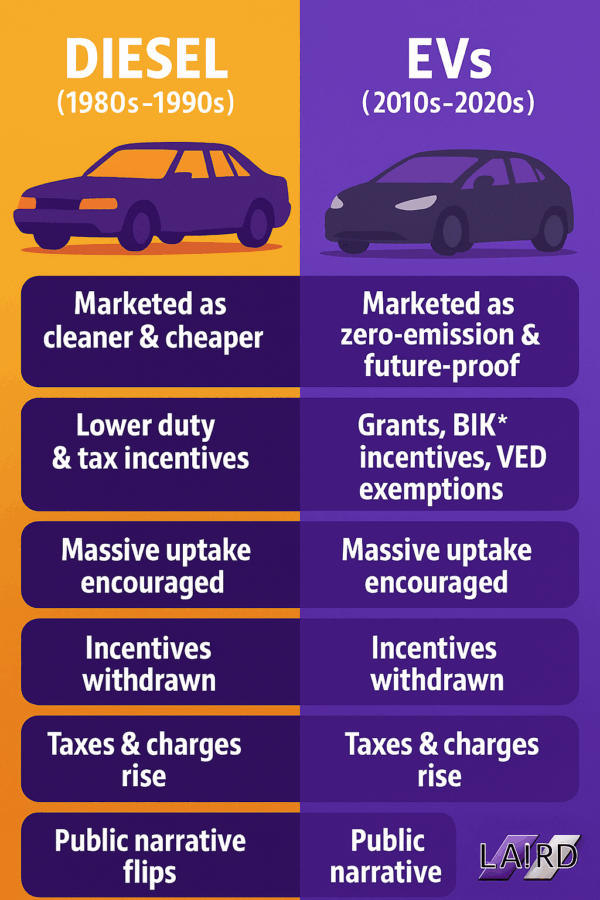If you’ve been driving long enough, the current situation with electric vehicles feels suspiciously familiar. It’s hard not to experience a sense of déjà vu as we’ve lived through this before. In the Nineties & early Naughties, the government spent years encouraging drivers to abandon petrol and embrace diesel. It was sold as cleaner, cheaper, better for the environment, and the “responsible” choice.
People listened. Fleets switched. Families upgraded. Manufacturers churned out diesel models at record pace. But then the tone changed. Incentives were quietly withdrawn, taxes reworked, and diesel cars once praised as eco-friendly rapidly became no different to petrol. Motorists who had followed the government’s nudge found themselves penalised for buying the very thing they had been encouraged to buy.
Fast-forward to today, and the pattern looks eerily similar.
Phase 1: Encourage the switch
Over the last decade, the UK government has strongly promoted electric vehicles. Grants, subsidies, favourable tax treatment and glowing campaigns all suggested EVs were the future.
- The Plug-in Car Grant knocked thousands off list prices.
- Company car drivers enjoyed extremely low Benefit-in-Kind tax rates.
- EVs were exempt from the London Congestion Charge.
- Road tax incentives made EVs the financially sensible choice.
The message was clear: switch now. Early adopters were praised, and early-majority buyers were told they were helping the country transition to a cleaner transport system.
Drivers made long-term decisions based on those signals, committing to new tech, new infrastructure and new financial outlays.
Phase 2: Withdraw the incentives once the public has committed
Then, almost as predictably as clockwork, the incentives started disappearing.
- The main purchase grant was axed entirely.
- Benefit-in-Kind rates on EVs have been scheduled to rise year after year.
- EVs will no longer be exempt from the London Congestion Charge.
- Road tax (VED) exemptions are ending.
- Public charging prices have risen sharply, yet incentives haven’t kept pace.
This is the same story diesel drivers experienced 20–30 years ago. Once enough people had made the switch, the policy landscape shifted. Drivers found themselves penalised for following the government’s previous advice.
The parallel is hard to ignore.
Why does this keep happening?
At the heart of it is a pattern of policymakers prioritising short-term behaviour change without committing to long-term support. Incentives are introduced to push drivers in a particular direction, but the moment uptake reaches a political comfort level, the benefits are rolled back.
The message becomes: “Thank you for switching; now here’s your new bill.”
By the time the average motorist realises the ground has moved beneath them, they’ve already invested in a diesel car, or in an EV, or in whatever the next government-endorsed technology may be.
The human cost: motorists caught in the crossfire
Motorists and businesses, not policymakers, shoulder the consequences:
- Fleets that moved to diesel to meet environmental targets were later hit with surcharges and bans.
- EV buyers who were told the Congestion Charge wouldn’t apply now face future fees.
- Company car drivers who chose EVs based on BIK advantages will see their tax bills rising every year.
- Families who paid a premium for an electric car on the basis of promised savings now watch those savings evaporate.
It’s not unreasonable to feel misled. When incentives are dangled to shape behaviour, only to be removed once that behaviour becomes mainstream, it leaves drivers footing the bill for political U-turns.
Is history repeating itself?
Look at the timeline side by side:
| Diesel (Late 80s – Early 90s) | EVs (2010s–2020s) |
|---|---|
| Marketed as cleaner & cheaper | Marketed as zero-emission & future-proof |
| Lower duty & tax incentives | Grants, BIK incentives, VED exemptions |
| Massive uptake encouraged | Massive uptake encouraged |
| Incentives withdrawn | Incentives withdrawn |
| Taxes & charges rise | Taxes & charges rise |
| Public narrative flips | Public narrative starting to flip |
It’s a near-perfect mirror.
Motorists deserve better
No one disputes the need for cleaner transport. And many EV drivers are extremely happy with their cars. But the pattern is deeply problematic: ask the public to change their behaviour, reward them for doing so, then quietly punish them once the market reaches a certain point.
This “bait and switch” approach undermines public trust, punishes early adopters, and makes people wary of the next major shift policymakers try to encourage.
If we want a greener, fairer transport future, the government must learn the lessons of the diesel saga. Incentives should be stable, long-term, and predictable; not pulled away just as the public begins to trust them.
Until then, motorists will continue to feel like they’re being led down the same road twice… and the road signs keep changing after they’ve already committed to the journey.

